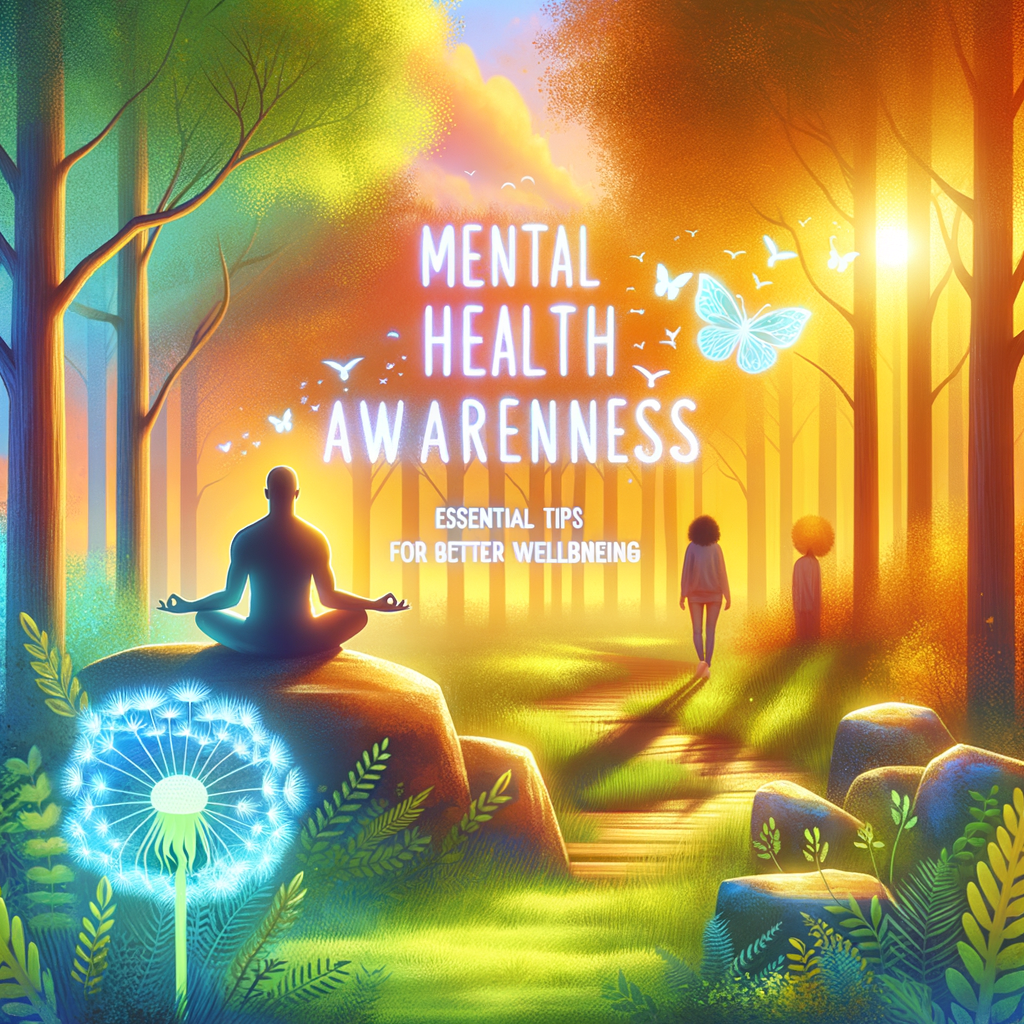
Mental Health Awareness: Essential Tips for Better Wellbeing
- Understanding Mental Health Awareness
- Importance of Prioritizing Mental Wellbeing
- Tips for Improving Mental Wellbeing
- Managing Stress Effectively
- Building Resilience and Coping Strategies
- Self-Care Practices for Mental Wellbeing
- Seeking Professional Help When Needed
- FAQs
- 1. Is mental health awareness important for everyone?
- 2. How can I support a loved one struggling with mental health issues?
- 3. What role does stigma play in mental health awareness?
- 4. Are there online resources available for mental health support?
- 5. How can I practice self-care in my daily life?
- 6. What are some signs that indicate I may need professional help for my mental health?
- 7. How can I reduce stress in my daily life?
- 8. Is it normal to experience mental health challenges?
- 9. How can I promote mental health awareness in my community?
- 10. What are some misconceptions about mental health?
- References
Understanding Mental Health Awareness
Mental health awareness is crucial for maintaining emotional well-being and overall health. It involves acknowledging and understanding the various aspects of mental health, including recognizing symptoms of mental health conditions and seeking help when needed. By being aware of mental health issues, individuals can take proactive steps to improve their mental well-being and lead healthier lives. It is important to break the stigma surrounding mental health and promote open conversations about it within society. Creating awareness about mental health not only benefits individuals but also helps in cultivating a more supportive and compassionate community.
Importance of Prioritizing Mental Wellbeing
Prioritizing mental well-being is essential for leading a fulfilling life. Just like physical health, mental health plays a significant role in our daily functioning and overall quality of life. Taking care of our mental health involves practicing self-care, managing stress effectively, and seeking professional help when necessary. By prioritizing mental well-being, individuals can enhance their resilience, cope with challenges better, and maintain positive relationships with others. It is important to incorporate healthy habits into daily routines to promote mental well-being and prevent the onset of mental health conditions.
Tips for Improving Mental Wellbeing
1. Practice Mindfulness: Engaging in mindfulness activities such as meditation, deep breathing, and yoga can help reduce stress levels and increase self-awareness.
2. Stay Active: Regular physical activity releases endorphins, which are known as “feel-good” hormones that can improve mood and reduce symptoms of anxiety and depression.
3. Maintain a Balanced Diet: Eating a nutritious diet can have a positive impact on mental health and overall well-being. Consuming foods rich in omega-3 fatty acids, antioxidants, and vitamins can support brain health.
4. Get Sufficient Sleep: Prioritize getting enough sleep each night as inadequate sleep can negatively impact mental health. Quality sleep is essential for cognitive function and emotional regulation.
5. Stay Connected: Building and maintaining social connections with friends and family can provide emotional support and reduce feelings of loneliness and isolation.
6. Set Boundaries: Learn to say no to commitments that may overwhelm you and establish healthy boundaries to protect your mental health.
7. Engage in Hobbies: Pursuing hobbies and activities that bring joy and relaxation can help reduce stress and increase feelings of satisfaction and fulfillment.
8. Seek Professional Help: Don’t hesitate to reach out to a mental health professional if you are struggling with your mental health. Therapy and counseling can provide valuable support and guidance.
By incorporating these tips into daily life, individuals can take proactive steps towards improving their mental well-being and achieving better overall health.
Managing Stress Effectively
Stress is a common part of life, but chronic stress can have a detrimental impact on mental health. Learning to manage stress effectively is crucial for maintaining mental well-being. Strategies for managing stress include practicing relaxation techniques, such as deep breathing and progressive muscle relaxation, engaging in physical activity, setting realistic goals, and seeking social support. It is important to identify sources of stress and develop healthy coping mechanisms to reduce its negative effects on mental health.
Building Resilience and Coping Strategies
Building resilience is key to navigating life’s challenges and maintaining mental well-being. Resilience involves adapting to adversity, trauma, or significant stress in a healthy and constructive way. Developing coping strategies, such as positive self-talk, problem-solving skills, and seeking support from loved ones, can help individuals bounce back from difficult situations. By cultivating resilience and coping mechanisms, individuals can better cope with stress, setbacks, and uncertainties, leading to improved mental health outcomes.
Self-Care Practices for Mental Wellbeing
Self-care is essential for nurturing mental well-being and promoting emotional health. Self-care practices involve taking intentional actions to care for oneself physically, emotionally, and mentally. Some self-care practices include setting aside time for relaxation, engaging in activities that bring joy, practicing gratitude, establishing healthy boundaries, and prioritizing personal needs. By incorporating self-care into daily routines, individuals can replenish their energy, reduce stress, and enhance their overall well-being.
Seeking Professional Help When Needed
If you are experiencing persistent feelings of sadness, anxiety, or other mental health concerns, it is important to seek help from a mental health professional. Therapy, counseling, and medication can be effective treatments for various mental health conditions. Remember that seeking help is a sign of strength, and there is no shame in reaching out for support when needed. A mental health professional can provide you with tools and strategies to manage your mental health effectively and improve your overall well-being.
FAQs
1. Is mental health awareness important for everyone?
Yes, mental health awareness is essential for everyone, regardless of age, gender, or background. It helps individuals recognize the signs of mental health conditions and seek appropriate support when needed.
2. How can I support a loved one struggling with mental health issues?
You can support a loved one by offering empathy, listening without judgment, encouraging them to seek professional help, and providing practical assistance when necessary.
3. What role does stigma play in mental health awareness?
Stigma surrounding mental health can prevent individuals from seeking help and can lead to feelings of shame and isolation. Breaking the stigma is crucial for promoting open conversations about mental health.
4. Are there online resources available for mental health support?
Yes, there are many online resources, such as helplines, chat support services, and mental health websites, that offer information and support for individuals struggling with mental health issues.
5. How can I practice self-care in my daily life?
You can practice self-care by setting aside time for activities you enjoy, prioritizing rest and relaxation, establishing boundaries, and engaging in activities that promote emotional well-being.
6. What are some signs that indicate I may need professional help for my mental health?
Signs that may indicate the need for professional help include persistent feelings of sadness or anxiety, changes in sleep or appetite, difficulty coping with daily stressors, and thoughts of self-harm.
7. How can I reduce stress in my daily life?
You can reduce stress by practicing relaxation techniques, such as deep breathing and meditation, engaging in physical activity, setting realistic goals, prioritizing tasks, and seeking support from others.
8. Is it normal to experience mental health challenges?
Yes, experiencing mental health challenges is normal, and it is important to remember that seeking help and support is a sign of strength, not weakness.
9. How can I promote mental health awareness in my community?
You can promote mental health awareness in your community by organizing educational events, starting conversations about mental health, advocating for supportive resources, and challenging stigma and discrimination.
10. What are some misconceptions about mental health?
Some common misconceptions about mental health include the belief that mental illnesses are not real, that seeking help is a sign of weakness, and that individuals with mental health conditions are dangerous or violent.
References
1. American Psychiatric Association. (2021). Mental Health Basics. https://www.psychiatry.org/patients-families/mental-health-basics
2. National Institute of Mental Health. (2021). Mental Health Information. https://www.nimh.nih.gov/health/topics/index.shtml
3. World Health Organization. (2020). Mental Health: Strengthening Our Response. https://www.who.int/news-room/fact-sheets/detail/mental-health-strengthening-our-response

